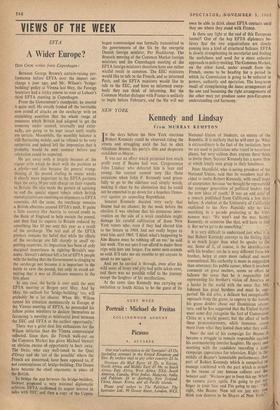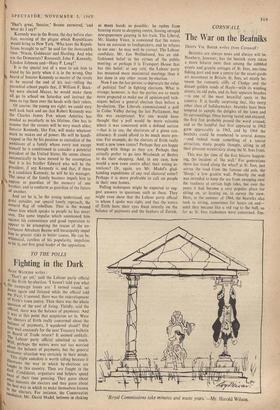NEW YORK
Kennedy and Lindsay
From MURRAY KEMPTON
Ithe days before the New York elections 'Robert Kennedy could be observed riding the streets and struggling until the last to elect Abraham Beame, his party's dim and desperate candidate as Mayor.
It was not an effort which promised him much profit even if Beame had won. Congressman John Lindsay who defeated him is lean and young; the contest seemed very like those occasions when John F. Kennedy used grace- fully to go to the sidelines and simply watch, making it clear by his abstention that he could not be expected to go down for a hopeless Demo- crat against an appealing Republican.
Senator Kennedy decided very early that Beame had no chance; by the week before the election it was obvious that his strenuous inter- vention on the side of a weak candidate might damage his careful cultivation of those New York voters who, even if they had elected him to the Senate in 1964, had not really begun to trust him until 1965. 'I think what's happening to Abe Beame must be rubbing off on me,' he said last week. 'I'm not sure I can afford to make these trips with him any longer. I've never seen crowds so cold. It'll take me six months to get anyone to speak to me again.'
And yet he carried it through, even after his wild sense of irony and pity had quite taken over, and there was no possible relief to the journey except the laughter of his recollections.
At the same time Kennedy was carrying an invitation to South Africa to be the guest of its National Union of Students, an enemy of the Republic. It is unlikely that he will ever go. What is extraordinary is the fact of the invitation; here we are used to politicians who travel to notorious places, but very seldom does anyone there think to invite them. Senator Kennedy has a name then at which lonely men grasp in their loneliness.
Peter Mansfield, who is acting president of the National Union, said that its members had de- cided to invite Robert Kennedy, with small hope
of acceptance, because 'we thought he representM the younger generation of political leaders arid the new ideas of youth.' It was an odd echo' of a remark published from California a few days before. A student at the University of California explained to the New Republic why he marching in a parade protesting at the Viet.- namese war: 'We won't end the war. Bobby Kennedy, or someone like that, will have to kifid it. But we've gO to do something.'
It is very difficult to understand just what it, is that Robert Kennedy conveys to the feeling that is so much lai-ger than what he speaks to the car. Some of it, of course, is the identification with his brother; yet he is very different from his
brother, being at once more radical and more conventional. His authority is more in suggestion than utterance; his public career, when it involves comment on great matters, seems an effort to balance the sense that he is responsible for representing his brother's vision of America as
a healer in the world with the sense that Mr.
Johnson has great burdens and must bc sup- ported. He did arise, a delicate but recognisable reproach from the grave, to express to the Senate his grave doubts about our Dominican adven- ture, and he has suggested that the United States must some day recognise the fact of Communist China as a world power; but the effect of both these pronouncements, while immense, arose more from what they hinted than what they said.
Near the end of his campaign for Bea me it became a struggle to remain responsible against his overmastering interior laughter. He spent one morning with the candidate recording a joint' campaign appearance for television. Right in the middle of Beame's lamentable performance, that part of Robert Kennedy which is compelled to manage combined with the part which is driVP to the rescue of any human sufferer and 10 Senator said : 'We have got to liven this up. When the camera starts again, I'm going to put rat finger in your face and I'm going to say : "Ai' right, Abe Beanie. Now tell ,me just why 1`0t1, think you deserve to be. Mayor of New York.
'That's great, Senator,' Beanie answered, 'and what do I say?'
Kennedy was in the Bronx, the day before elec- tion, warning of the plague which Republicans would bring to New York. 'Who have the Repub- licans brought to us?' he said for the thousandth time. 'Nixon, Goldwater and Harding. And who are the Democrats? Roosevelt, John F. Kennedy, Lyndon Johnson and—Huey P. Long!'
It is the special test of a man to ask him to stand by his party when it is in the wrong. One heard of Senator Kennedy as master of the revels as he neared the end of his test—telling the parochial school pupils that, if William F. Buck- ley were elected Mayor, he would make them all go to school on Saturday and instruct the nuns to rap them over the heads with their rulers.
Of course; the young are right; we could very well look back and see that Robert Kennedy was the Charles James Fox whom America has needed so peculiarly in his lifetime. One has to assume that the careers will be very much alike; Senator Kennedy, like Fox, will make whatever mark he makes out of power. He will be handi- capped in this by his position as custodian of the ambitions of a family whose every son except himself he is conditioned to consider a potential president of the United States. He seems almost automatically to have moved to the assumption that it is his brother Edward who will be the president, if any Kennedy is, and that, if there is a candidate Kennedy, he will be his manager. The sense of the family business impels him to oppose as guardian of the memory of one brother, and to conform as guardian of the future of another.
And yet he is, 'as the young understand, our great outsider, our special lonely reproach, the natural flag of rebellion. That is the wound about him which speaks to people he has never seen. The same impulse which summoned hiin against his convenience and good reputation to appear to be attempting the rescue of the un- fortunate Abraham Beame will inescapably impel him to greater risks in better causes. He can be, Whimsical, careless of his popularity, impulsive as he is, our first great leader of the opposition.







































 Previous page
Previous page